Daily Vocabulary Words: List of Daily Used Words
Hi there. Welcome to this special section @ Wordpandit.
Our endeavour here is straightforward: highlighting important daily vocabulary words, you would encounter in The Hindu. This is your repository of commonly used words; essentially, we are posting a list of daily used words. Hence, this has significant practical application as it teaches you words that are commonly used in a leading publication such as The Hindu.
Visit the website daily to learn words from The Hindu.
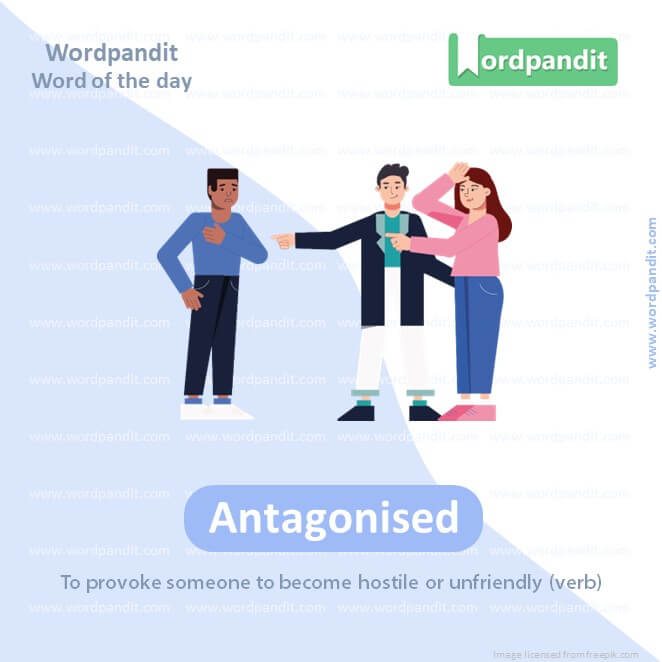
WORD-1: Antagonised
CONTEXT: This was a highly risky strategy, considering the party’s defeat in Karnataka in May after it antagonised regional satraps and caste groups.
SOURCE: The Hindu
EXPLANATORY PARAGRAPH: Imagine you have a friend, and you do something that makes them really, really upset or annoyed, like taking their favorite toy without asking. That’s like antagonising them. It’s when you do something that causes someone else to get angry or upset with you.
MEANING: To provoke someone to become hostile or unfriendly (verb)
PRONUNCIATION: an-TAG-uh-nized
SYNONYMS: Irritated, Provoked, Annoyed, Aggravated, Agitated, Incensed
USAGE EXAMPLES:
1. The boy antagonised his sister by hiding her favorite doll.
2. Her remarks antagonised her colleagues, causing a heated debate.
3. The policy changes antagonised many long-time supporters of the organization.
4. Constantly interrupting the speaker antagonised the audience.
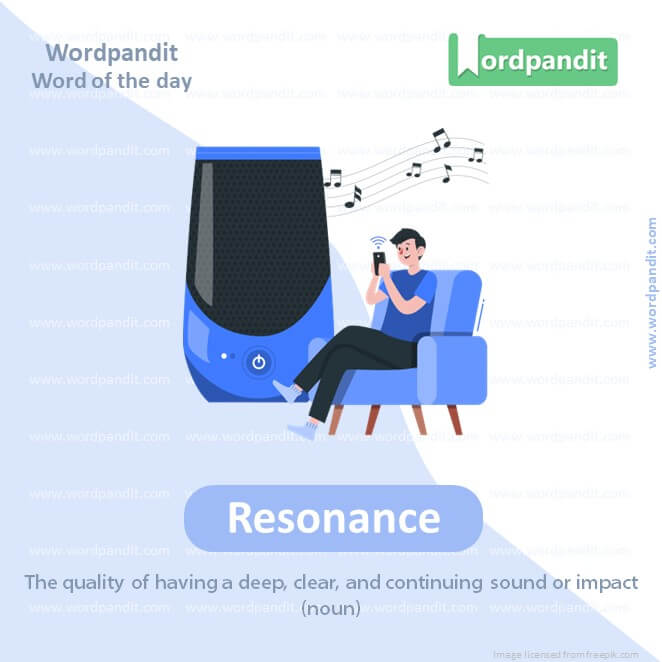
WORD-2: Resonance
CONTEXT: the election of Mallikarjun Kharge as president had some resonance in Telangana where the ruling BRS relied heavily on Chief Minister K. Chandrashekar Rao’s family, but against the BJP in the heartland, these were not adequate.
SOURCE: The Hindu
EXPLANATORY PARAGRAPH: Resonance is like when you throw a stone in a pond and you see the ripples going out and out. It’s when something has a big effect or impact, like a story or music that makes you feel strong emotions or remember it for a long time.
MEANING: The quality of having a deep, clear, and continuing sound or impact (noun)
PRONUNCIATION: REZ-uh-nuns
SYNONYMS: Reverberation, Echo, Impact, Significance, Influence, Vibes
USAGE EXAMPLES:
1. The song had a deep emotional resonance with the audience.
2. The speech’s resonance was felt long after it ended.
3. The resonance of the bell could be heard across the valley.
4. The historical event holds a strong resonance in the cultural memory.
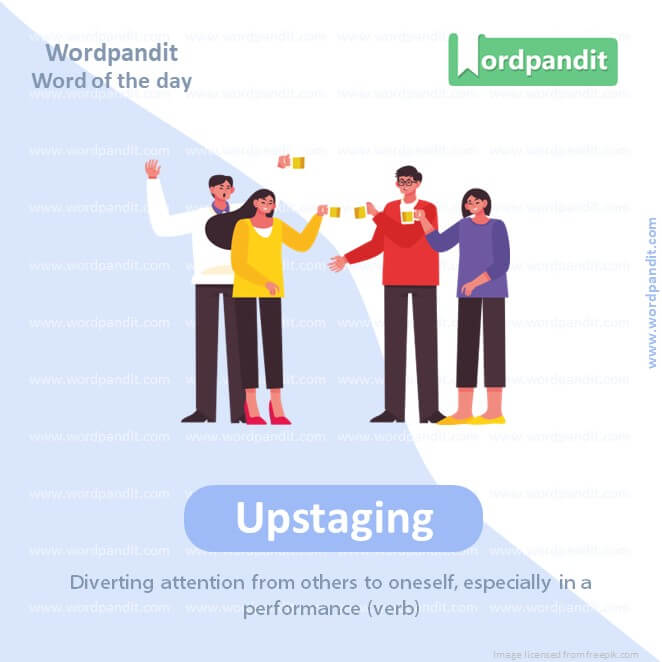
WORD-3: Upstaging
CONTEXT: The southern dreams of the BJP remain distant. By upstaging a regional party, the Congress has demonstrated a possibility.
SOURCE: The Hindu
EXPLANATORY PARAGRAPH: Upstaging is like when you’re in a play, and someone tries to make themselves look more important than you, so everyone watches them instead. It’s like trying to be the star and making others look less important.
MEANING: Diverting attention from others to oneself, especially in a performance (verb)
PRONUNCIATION: up-STAY-jing
SYNONYMS: Overshadowing, Outshining, Dominating, Stealing the show, Eclipse, Surpass
USAGE EXAMPLES:
1. The lead actor was accused of upstaging his co-stars.
2. Her elaborate dress upstaged everyone else at the party.
3. The sudden news announcement upstaged the scheduled event.
4. He has a habit of upstaging others during meetings.
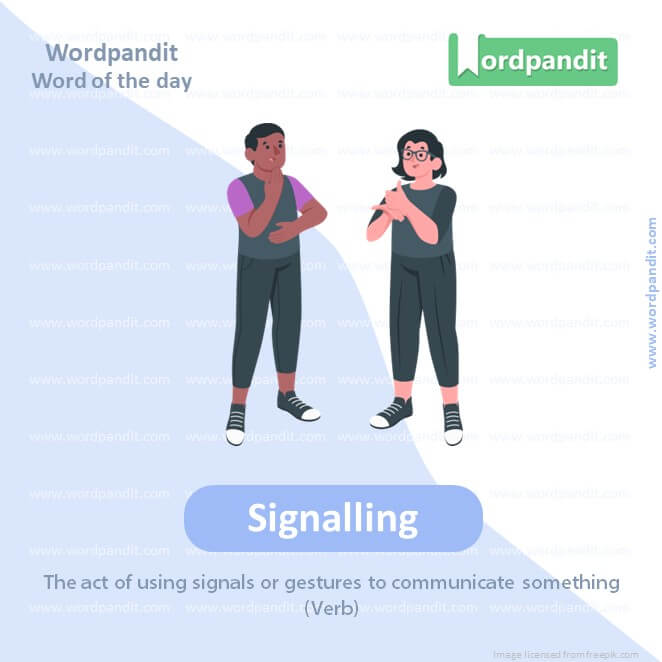
WORD-4: Signalling
CONTEXT: the newly operationalised fund, while signalling optimism at COP28 and a diplomatic victory for its Emirati president, has crucial issues.
SOURCE: The Hindu
EXPLANATORY PARAGRAPH: Signalling is like when you wave your hands to tell your friend something from far away, like “come here” or “go there.” It’s when you use actions, lights, or sounds to send a message or give information to someone.
MEANING: The act of using gestures, actions, or sounds to convey information or instructions (verb)
PRONUNCIATION: SIG-nuh-ling
SYNONYMS: Gesturing, Indicating, Beckoning, Motioning, Waving, Signifying
USAGE EXAMPLES:
1. The traffic lights are used for signalling when to stop and go.
2. He was signalling to the waiter to bring the bill.
3. Birds use special calls for signalling danger.
4. Signalling in sports can convey strategies between players.
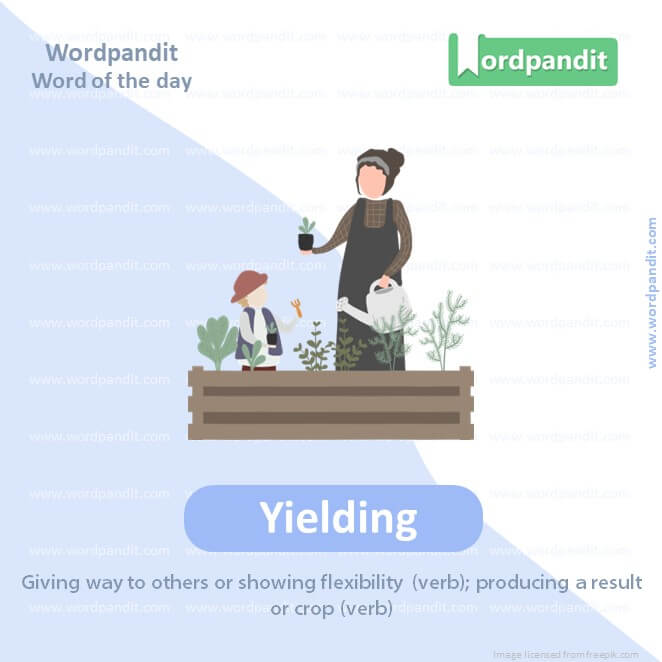
WORD-5: Yielding
CONTEXT: Developing countries resisted this proposition at first before yielding at the TC-5 meeting, in exchange for some concessions.
SOURCE: The Hindu
EXPLANATORY PARAGRAPH: Yielding is like when you let your friend play with your toy because you want to be nice and share. It means giving in or letting someone else have their way because you want to be kind or avoid a fight.
MEANING: Giving way to others or showing flexibility (verb); producing a result or crop (verb)
PRONUNCIATION: YEEL-ding
SYNONYMS: Surrendering, Ceding, Relinquishing, Producing, Generating, Bearing
USAGE EXAMPLES:
1. The metal was yielding under the pressure.
2. He was yielding to her demands to keep the peace.
3. The fruitful tree was yielding a lot of apples.
4. By yielding his position, he allowed for a smoother negotiation.
WORD-6: Replenished
CONTEXT: they will be periodically replenished is not clear. The committed amounts are also insufficient, totalling $450 million (for now) against an actual demand of several billion dollars.
SOURCE: The Hindu
EXPLANATORY PARAGRAPH: Replenished is like when you fill up your water bottle after it’s empty. It means to make something full again or to replace what has been used up.
MEANING: To refill or restock something that has been used or depleted (verb)
PRONUNCIATION: re-PLEN-ished
SYNONYMS: Restocked, Refilled, Renewed, Topped up, Refreshed, Supplemented
USAGE EXAMPLES:
1. The kitchen supplies were replenished for the next week.
2. The lake was replenished after the heavy rains.
3. She replenished her energy with a good night’s sleep.
4. The store replenished its shelves with new products.
WORD-7: Pedantic
CONTEXT: The L&D fund’s contents need to be easily accessible to those who need it most, in timely fashion, sans pedantic bureaucratic hurdles, and in sufficient quantities.
SOURCE: The Hindu
EXPLANATORY PARAGRAPH: Pedantic is like when someone is very, very picky about small details, like correcting how you say a word or how you do a little part of your homework. It’s when someone pays too much attention to tiny details and rules.
MEANING: Overly concerned with minor details or rules, often in teaching or studying (adjective)
PRONUNCIATION: pe-DAN-tik
SYNONYMS: Over-scrupulous, Nitpicking, Over-particular, Dogmatic, Meticulous, Fastidious
USAGE EXAMPLES:
1. His pedantic approach to teaching made the subject less enjoyable.
2. She made a pedantic correction to his pronunciation.
3. The article was criticized for being too pedantic and detailed.
4. His pedantic attitude was apparent in all his meticulous notes.
WORD-8: Conceptualising
CONTEXT: Disability as an identity and entity exists at the intersection of multiple vulnerabilities — social, economic and gender — with each facet requiring careful consideration when conceptualising action for equity.
SOURCE: The Hindu
EXPLANATORY PARAGRAPH: Conceptualising is like when you think of a cool idea for a story or a game in your head. It means creating a plan or an idea in your mind about how something could be done or what it could look like.
MEANING: Forming a concept or idea of something in the mind (verb)
PRONUNCIATION: con-SEP-tu-uh-lizing
SYNONYMS: Envisioning, Imagining, Ideating, Theorizing, Formulating, Conceiving
USAGE EXAMPLES:
1. She was conceptualising a new approach to the project.
2. The team spent hours conceptualising their marketing strategy.
3. Conceptualising the design took longer than expected.
4. He excels at conceptualising complex scientific theories.
WORD-9: Exclusionary
CONTEXT: Current systems are designed for persons without disabilities and end up being exclusionary to people with disabilities, resulting in them experiencing higher instances of poverty
SOURCE: The Hindu
EXPLANATORY PARAGRAPH: Exclusionary is like when you have a club, and you don’t let someone join because of a certain rule, like “no younger siblings allowed.” It means leaving someone out or not including them because of certain reasons or rules.
MEANING: Relating to the act of preventing someone or something from participating or being included (adjective)
PRONUNCIATION: ek-SKLOO-zhun-air-ee
SYNONYMS: Discriminatory, Restrictive, Isolating, Segregative, Preclusive, Ostracizing
USAGE EXAMPLES:
1. The exclusionary policy barred certain groups from joining.
2. She criticized the club’s exclusionary practices.
3. The exclusionary rule in law prevents certain evidence from being used.
4. Their approach was seen as exclusionary and unfair.
WORD-10: Enumerated
CONTEXT: The first step is awareness to ensure last-mile connectivity of the benefits enumerated for people with disabilities by the government
SOURCE: The Hindu
EXPLANATORY PARAGRAPH: Enumerated is like when you list things one by one, like when you tell someone all the different kinds of ice cream flavors you know. It means counting or naming things one after another.
MEANING: To list or count off one by one (verb)
PRONUNCIATION: ee-NOO-muh-ray-ted
SYNONYMS: Listed, Counted, Itemized, Catalogued, Specified, Ticked off
USAGE EXAMPLES:
1. The teacher enumerated the rules of the classroom.
2. He enumerated his reasons for disagreeing.
3. The benefits were clearly enumerated in the report.
4. She enumerated the steps involved in the procedure.
Vocabulary Synonyms
In the intricate weave of language learning, ‘vocabulary synonyms’ emerge as a key element that adds depth and variety to expression. These different words with similar meanings enrich our vocabulary, enabling us to communicate with precision and clarity. However, grasping ‘vocabulary synonyms’ successfully warrants a systematic approach.
When approaching ‘vocabulary synonyms’, context is your compass. Engage with various reading materials like novels, newspapers, and digital content to explore and understand how these synonyms are used in different situations. This exposure will fortify your comprehension of ‘vocabulary synonyms’ and their usage nuances.
Employing memory-enhancing techniques can cement your grasp on ‘vocabulary synonyms’. Employing flashcards is an effective method where one side contains the word you know, and the other side has its synonyms. Also, creating mind maps, linking the known word to its various synonyms, can be an engaging way to learn ‘vocabulary synonyms’.
To master ‘vocabulary synonyms’, take an active role in application. Regular conversations, written communications, digital interactions – all of these offer ample opportunities to utilize learnt synonyms. This practice refines your application and accelerates internalization of ‘vocabulary synonyms’.
Embracing language exchange platforms or engaging with native speakers can provide invaluable feedback on the usage of ‘vocabulary synonyms’. This interaction can further enhance your understanding of the cultural idiosyncrasies of word usage.
In conclusion, learning ‘vocabulary synonyms’ is a rewarding pursuit that adds layers of complexity to your language skills. A thoughtful blend of diversified resources, memory tools, practice, and interactive learning can make the task of mastering ‘vocabulary synonyms’ an enjoyable and fruitful journey. Every synonym learnt paints your vocabulary with different shades of understanding, making your language canvas all the more vivid and spectacular!













